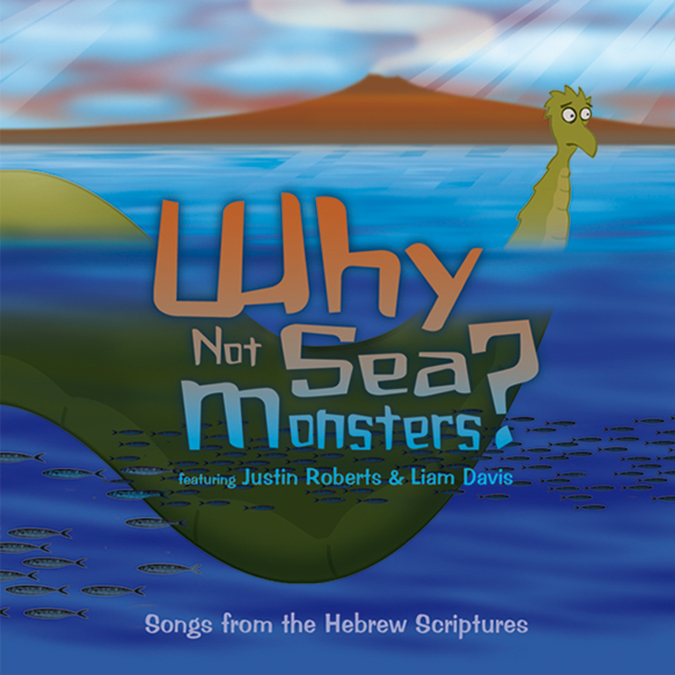
Yesterday I cried at a kids’ song. We were in the car going to visit my parents, and somewhere along Route 519, this song that I’ve heard a dozen times overwhelmed me.
The song was “Nothing Much in Tarshish” from the album Why Not Sea Monsters?: Songs from the Hebrew Scriptures by Justin Roberts, a collection of charming and inventive, if not always strictly accurate, musical retellings of Bible stories. This one recounts the story of Jonah, the Israelite prophet, who “on the way to Tarshish, got swallowed by a large fish.” Roberts sings that
God is in the fish
It all comes down to this
It’s so dark, dark, dark
It’s so cold, cold, cold
But there’s more love, love, love
Than you can hold, hold, hold, hold
There’s so much biblical truth compressed into these lines. Jonah was indeed in the dark and cold. When Jonah prayed from the belly of the fish, he described the waves closing over him like bars and (particularly revolting to me) seaweed wrapping around his head (Jonah 2:5). Beyond this literal darkness, Jonah was in the darkness of his own sin and outright rebellion against God. God had sent Jonah to prophesy to Nineveh, but Jonah instead took a ship to Tarshish. He intended to flee “away from the presence of the Lord” (Jonah 1:3). For those like me without a strong grasp on ancient geography, here’s a useful map. Tarshish is in Spain, much further away from Jonah’s home than Nineveh, in the opposite direction, across the entire Mediterranean Sea. Had Jonah followed God’s command, he wouldn’t even have been on the sea, but now due to his sin he was trapped beneath it.
It is out of this drowning darkness that God rescued Jonah into the belly of the fish. Jonah prayed, “When my life was fainting away, I remembered the Lord, and my prayer came to you, into your holy temple. Those who pay regard to vain idols forsake their hope of steadfast love” (Jonah 2:7-8). Jonah recognized that he had not successfully fled God’s presence; God was at work in the storm, in the sea, and in the fish. God pursued Jonah through his rebellion. Jonah described this relentless pursuit as “steadfast love.” This is God’s covenant love at work!
Now, the fish, arguably, was still dark. We’re told Jonah was in the belly of the fish three days and three nights before he prayed (Jonah 1:17). Like Jonah, we can be stubborn, stiff-necked people. We may suffer under God’s discipline for a time, but as the song says, “God is in the fish!” His purpose is always to pursue his people with covenant love, to bring us to repentance, and to show us that he is our only salvation. It took three days in the dark, but Jonah learned: “But I with the voice of thanksgiving will sacrifice to you; what I have vowed I will pay. Salvation belongs to the Lord!” (Jonah 2:9).
Jonah was not the only one in the dark in this story. Roberts sings about “lonely Nineveh.” “Lonely” is not the word Jonah would have used to describe the thriving capital city of the brutal Assyrian empire. He might have used “wicked” or “godless” or “irredeemable.” God described them differently. “And should not I pity Nineveh, that great city, in which there are more than 120,000 persons who do not know their right hand from their left, and also much cattle?” (Jonah 4:11). The city was utterly ignorant of God—true darkness indeed. Jonah hated them for their wickedness, but God pitied them. God had no covenant relationship with Nineveh, no reason to offer them repentance. Sin doesn’t deserve a second chance; God could have rained brimstone on Nineveh and remained just. But in his infinite mercy, he sent Jonah, and, after the least inspiring sermon ever, “the people of Nineveh believed God” (Jonah 3:5), and God relented.
The book of Jonah foretells the vast scope of Christ’s work on the cross. It reaches the ignorant and pitiable, the backsliding and hypocritical, the rebellious and hateful. It reaches those that God has no business saving.
This is why I cried as the fence posts passed by on Route 519. God loved Jonah in his sin with relentless, pursuing covenant love. God loved Nineveh in their utterly lost state with mercy even for those who were not yet his people. If God can love Jonah, and God can love Nineveh, God can certainly love me and you.
What a beautiful truth to sing to our children and to our own hearts—that we will sin, and run away from God, and God will discipline us, but God is in the fish. His steadfast love pursues us through the dark.
Photo credit: Justin Roberts
- The House No One Could Love - July 12, 2023
- Movie Recommendation: The Star (2017) - December 28, 2022
- When Shall We Fold Socks? - November 16, 2022

